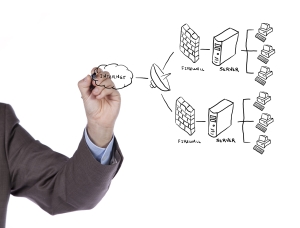You can imagine this conversation can’t you…
“So, what are we going to do about people bringing their own IT equipment and wanting to connect to
the corporate network and then using social media…it’s a minefield/disaster waiting to happen.
If we issue a policy though, we can nip this in the bud and anyone who does stupid things, we are then
protected and can throw the book at them.”
FFS.
So here’s my vex. HR people AT ALL LEVELS who don’t get/understand/use technology and digital
tools /services are in NO POSITION to rule / arbitrate / guide / advise / block / enable /govern and
even comment on such things. And this state of blissful ignorance or agnostic approach to technology
and that “it’s someone else’s issue “/ “IT sort all that stuff out” – is frankly slack and not good enough.
Marketers get it; Internal Comms gets it; Operations gets it.
I don’t know how to REALLY use XML tags; I don’t know how to code in Java; I would struggle to
build a full on website; I haven’t mastered as many social technologies as I’d like to but at least I
am keen enough to keep learning, experimenting and diving in to technology’s rich pool of
opportunities.
OK I have the benefit of 10+ years of working in and around IT-enabled change projects. I was
even a SQL+ and Oracle Forms programmer / analyst for all of 9 months – I hated it.
Not me at all.
My education and career achievements to that date gave me no right to even be considered
for an IT role but I got it on merit and through a test. Forgetting the test, on merit because
when in a business role (so this pre- dates my HR time) I was intrigued, perplexed and keen
on what technology could do to help this thing called work. Never mind social, play and
commerce – just work. And so I devoted time and intellectual effort to understand, explore
and utilise technology as best I could. I am talking DOS-based PCs; early Word Processing /
spreadsheets and Green-Screen databases.
I worked on a mainframe system that took data from large reel tapes and produced
documentation and mailed it out – all using hardware including a big bit of kit that folded
documents and inserted them into envelopes and sealed the envelopes. Boy the amount
of jams those used to have. But the ability to process high volumes transactional processes
was an efficiency gain to help any business make the best of its resources.
I wasn’t just content to use the equipment – I wanted to know how it all worked; what skills
people needed to make that early data exchange system work. A COBOL system and ASCII
formats were things I wanted to know about. I wasn’t even in job design roles then, but I was
intrigued by this new technology-savvy team of people we employed.
I was in a business role at the time – my team and I picked up the manual / analogue follow on
from this initial digital exchange/process. So when my team were being trained by me in the
manual follow on it was CRITICAL to me that they knew what, why, how and when this digital
exchange happened. When they handled queries from people, they needed to explain the
digital back-story that preceded the manual handling.
It worked. I even set up some technology savvy people who would later make great Project
Team members when I set up future projects on centralising and digitising more admin work.
I was a process re-engineer and a future proofer of skills and insight without realising it.
I got involved in networking installations. I understood the term IT Infrastrucure intimately
and could solve minor software and hardware issues myself – including patching devices into
the network through RJ45 cables. I knew the difference between an RJ11 and an RJ45.
So when there was a people issue around IT, people called on me. I understood people but
more so the technology bit. I was seconded onto a huge piece of work with the incoming CIO.
I wasn’t a technologist but people liked that – I had the heart of someone from the business
with a digitally wired brain. I got to the stage where I was leading think tanks; focus groups;
working parties; conferences and events around people/work/technology. Conference
speaking in Italy, Austria, Netherlands and the US all came from my role in “translating” people/
work/tech.
So when I moved over to HR as a profession it was via the Learning & Development route. And
my intrigue in IT continued as we explored early e-learning (boy it was bad); systems to support
administration of L&D and HR functions and processes. I was also hugely interested in the
psychology of using digital and it was at this time that emails had their vice like grip on the world
of knowledge work. Mobile phones had gone from call-making kit to messaging exchange devices
and I bought my first PDA (and got my boss in on the act) so we could had have emails and
documents on the go. Laptops became network synchronized devices and not just offline portable
word processing and presentation aid devices.
And unlike a lot of my HR colleagues, I understood how to manage your Outlook Exchange profile
and size of your inbox so you didn’t get any embarrassing “couldn’t send your message as the
recipient’s inbox is full” bounce backs. I understood the difference between an HTML message and
Rich Text one (size on the server for a start). I despaired at people with 2000 messages in an inbox and
windows explorer file structures a 9 year old would be embarrassed about.
So I got seconded onto new projects with new hardware/software platforms. When the Internet was
opened corporately, I was part of the process of thinking how this would need to be positioned (even
in those days I was against overly prescribed punitive policies). I understood the differences between
Windows NT and Windows XP so when I built the training for the “users”, I translated. I learned, and
then I helped others learn. And through that, I feel I made the technology more effective, efficient and
deliver on its promise/expectations.
Isn’t that what it’s all about?
So I am fortunate maybe, that I had a career back story that enabled me to be an HR-based technologist.
Sure. I think it was a naturally occurring set of circumstances and an inevitable for me.
I guess this is why I am so vexed about HR’s – frankly pathetic – “I don’t get all this new technology. But
I am an expert in TUPE / Kolb”.
Fine, You show me somewhere that hasn’t got technology driving everything about that business and
that’s good enough.
HR folks, I believe you need be competent enough to say “I am an expert in TUPE/Kolb and I get how /
what technology means to people/work / commerce / efficiency / engagement / leadership etc.”
And you need to use that technology to understand it. Or partner / be mentored / wised-up by
someone who does.
So don’t you dare do something around the build of a role profile without knowing the impacts the
supporting IT infrastructure and applications has on that. NOT GOOD ENOUGH.
Don’t construct a business case for HR Information Systems without doing a root and branch
review of what data you need and why; what processes will add value and what won’t and how
you can skill your HR and Business to maximise the benefit of this. ANYTHING LESS THAN A
COMPREHENSIVE UNDERSTANDING HERE IS NOT GOOD ENOUGH
And don’t even utter the words to commence putting together of a Social Media / BYOD policy
without deeply understanding what this is all about. Such lazy and frankly backward thinking
means you should be ashamed of yourself. NOT GOOD ENOUGH.
So I just don’t want to hear “I’m in HR. I don’t have to/want to get technology and all this stuff
about Apps / Augmented Reailty etc. Is about”.
Our present and our future will be even more intricately positioned with technology advances.
The debate on BYOD is NOTHING compared to the potential augmentation of people’s intellect
and physical abilities through technology. Read Ray Kurzweil’s “The Singularity Is Near” and
Jaron Lanier’s “You Are Not A Gadget”. Check ou Professor Steve Wheeler’s blogs.
Look at Jane Hart’s Slideshares. Follow Mashable on Twitter. See Dan Tapscott and Clay Shirky
speak on TED.com.
If you don’t understand the trail of causality between reading a blog via a tweet and
capturing a huge new client or avoiding a PR disaster – then you are missing the point.
I called 3 things out in a guest blog for Halogen Software
(http://www.halogensoftware.com/blog/the-future-role-of-human-resources-is-one-of-architect/)
so I repeat it here.
HR as architect of people; technology and flow.
The middle bit of this is where HR is – I am sad to say – way too under-informed and under-skilled.
This cannot go on. How can WE radically improve “work” and efficiency in alls it various guises,when
we don’t even know how technology can drive that radicalisation?
If we’re behind now, we’ll be lost for good over the next 5 years. Moore’s Law says so.
HR folks – please do more to get digitally-savvy. Our survival depends on it.
RIP Analogue-only HR.






And RIP silos, HR included. The future is a foreign country – they do things differently there.
– Bob
[…] Perry Timms: #PunkHR – HR People Getting Technology/Digital Is Not Radical It’s FUNDAMENTAL HR departments that absolve themselves from interest in and responsibility for IT/ technology/ social media as it affects their organisation? “NOT GOOD ENOUGH.” This must be one of the most passionately-argued HR blog posts of the year. Perry’s conclusion is wonderful: “RIP Analogue-only HR.” Follow Perry on Twitter. […]
I truly believe that the HR people should try their hands on technological fields too as it will greatly help them in their future endeavours.